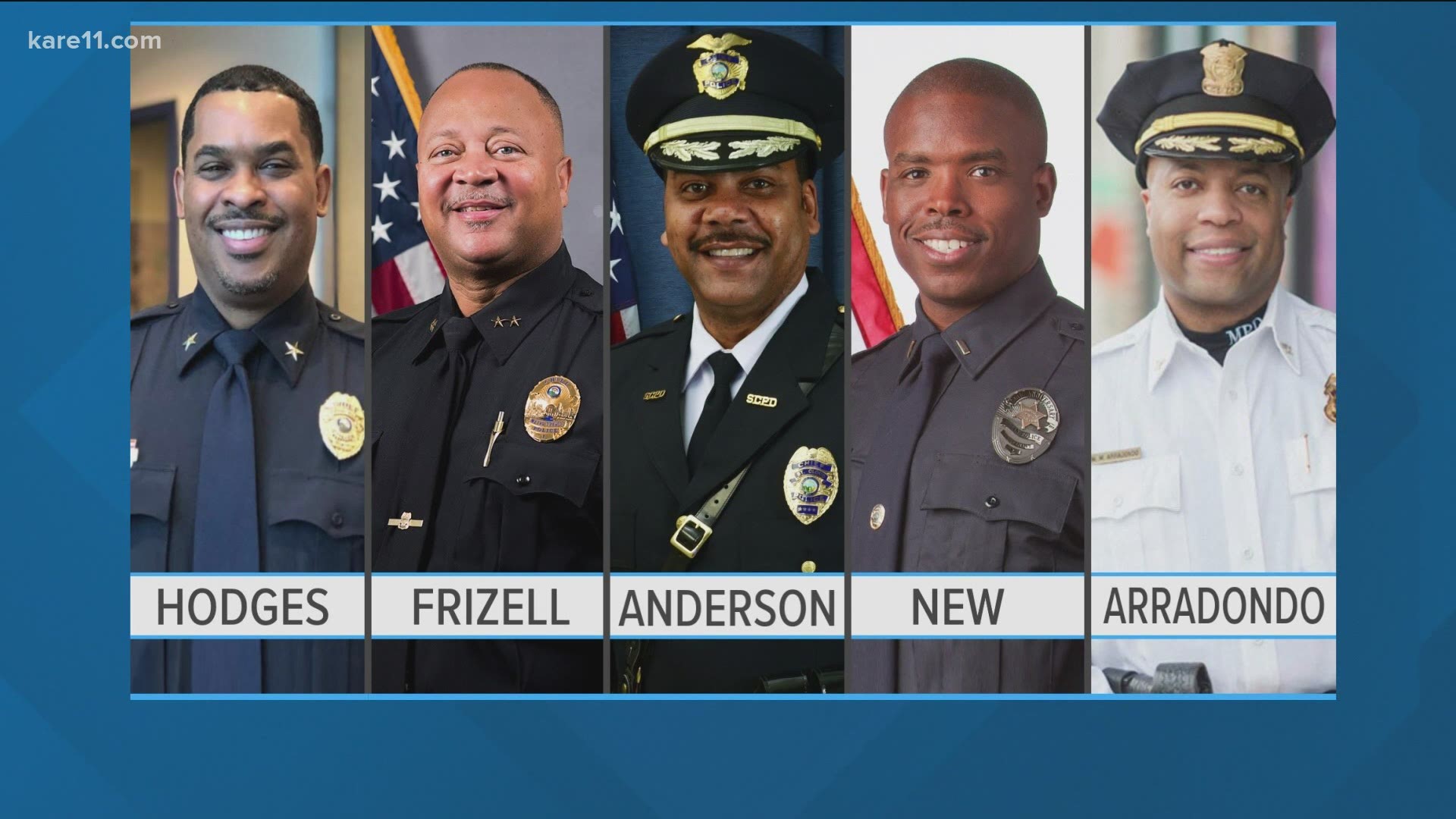ST PAUL, Minn. — The death of George Floyd during an arrest last Memorial Day reverberated across the planet. It also changed how many law enforcement agencies approach policing in communities already traumatized by the effects of systemic, historic racism.
"May 25 has changed the role of policing and conversations about race," Minneapolis Police Chief Medaria Arradando said Friday during a panel discussion features Minnesota's Black police chiefs.
"Communities are leaning in and they’re asking us questions about do we value them? Are we truly committed to changing a profession that -- particularly for African American and other BIPOC communities -- has not served them well?"
Dept. of Public Safety Assistant Commissioner Booker Hodges hosted the panel with Chief Arradondo, Metro Transit Police Chief Eddie Frizell, St. Cloud Police Chief Blair Anderson and Eagan Police Chief Roger New.
"What can we do to prevent any more George Floyds?" Hodges asked rhetorically.
"I’m talking about how does a brother who appears to have good family and the whole nine yards. How does this brother end up in that situation?"
Commissioner Hodges said there are 250 Black police officers in Minnesota, out of nearly 11,000 total officers. The death of George Floyd accelerated efforts to diversify departments.
"A police department should reflect the community which it serves," Chief Frizell remarked, pointing out proactive efforts to diversify the Metro Transit Police Department so it's more in line with the racial mix of bus and transit riders.
"If you understand the rhythm on the streets, you understand the people, their conditions, the reasons people do what they do, you’re more likely to be more empathetic to their conditions."
George Floyd suffocated under the knee of former Officer Derek Chauvin, who goes on trial for murder later this month. He was initially arrested after being accused of trying to spend a counterfeit $20 bill at a story on the city's south side.
"Okay if you’re here for a $20 bill potentially counterfeit, let’s see what the real deal is here. Is there more going on? Is my life in danger simply because that person does not look like me?" Chief Frizell added.
Arradondo pointed to the need to for police departments look at the broader economic challenges faced by their communities.
"We’re part of an ecosystem. How do we connected with other things that impact the work we do?" Rondo said.
"Whether it’s housing, whether it’s mental illness our community is suffering, whether it’s addiction issues, even employment – these are all things that impact public safety."
Commissioner Hodges said he can envision a system where officers rotate between police work and community assistance work, so they gain a better understanding of the needs of those they will be policing when they go back on patrol.
Black Lives Matter
The chiefs seemed to agree that the Black Lives Matter movement shouldn't be demonized or perceived as an enemy of law enforcement. They said most of the protesters marching on the streets share a common concern for the core issue of public safety.
"There are a number of people here in Minnesota and throughout the country that are Black Lives Matter supporters and they also supporters of public safety," Chief Roger New explained.
"And we shouldn’t be confused about that. We don’t have competing interests. They have similar interests."
New said his department in Eagan has an ongoing dialogue with community members, which is helpful to both police and the people they're serving.
"It really serves a two-fold purpose, to create relationships with those members of the community, as well as giving us an opportunity to explain what our profession is."
St. Cloud Chief Blair Anderson said police in Minnesota aren't comfortable taking public scorn for acts committed by a few bad officers.
"We know 99 percent of the men and women that go out and do this job do it the right way for the right reasons," Chief Anderson told the fellow chiefs.
"Sadly enough, we all get judged by the transgressions of a few. That’s particularly disturbing to me because as a person of color we know what that feels like to be judged by your worst elements."
Anderson said he'd like the BLM protesters to go beyond marching and take part in his department's work mentoring at-risk youth and other community engagement efforts the St. Cloud Police Dept. has going.
"If you really want to see substantive and sustainable change, call me and come and work with those kids. Come and work with our officers who are working with those kids."

